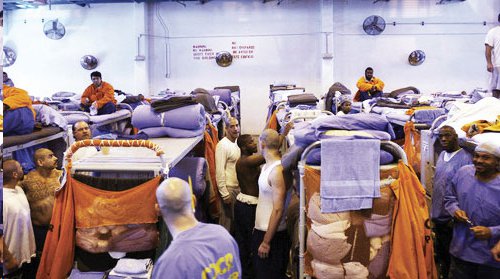How to Reduce America’s Reliance on Incarceration

From our content partner, New America Media:
Opinion:
There is momentum building in California and around the country for common sense criminal justice practices that reduce America’s overreliance on incarceration. Even those who have been the most ardent proponents of flawed Get Tough on Crime polices have come around. The United States Justice Department, hard right-wing politicians, and even some victim groups have all agreed that there are far too many people incarcerated in this country, at far too great a cost to society.
But the purportedly progressive Gov. Jerry Brown and even the state Democratic caucus are poised to launch one of the country’s only state prison expansion plans. At a time when most states are reducing the number of inmates and closing prisons, California is preparing to expand the number of prison beds. Even in the face of a federal Three Judge Panel order which was re-confirmed by the U.S Supreme Court to reduce the state’s overcrowded prisons, Gov. Brown is defiantly moving forward with a plan that will hurt the residents of California.
Speaking in California recently, the U.S. Attorney General Eric Holder said, “Too many Americans go to too many prisons for far too long, and for no truly good law enforcement reason.” The Attorney General went on to explain that, “Widespread incarceration at the federal, state, and local levels is both ineffective and unsustainable. It imposes a significant economic burden – totaling $80 billion in 2010 alone.”
In agreement with this sentiment, last year California voters approved Prop. 36 to amend the notorious Three Strikes Law so that individuals convicted of nonviolent offenses are not sentenced to life in prison. A few months earlier, the California Legislature approved and the Governor signed into law SB 9, which prohibits children from being sentenced to life in prison without the possibility of parole. A number of recent polls also show that California voters very clearly prefer rehabilitation over incarceration and agree that too much money is being wasted by the state on prisons.
In a recent Op-Ed in the Fresno Bee, former Republican House Speaker Newt Gingrich and former Republican leader of the California Assembly Pat Nolan, urged the state legislature to pass SB 260, a bill that would reduce incarceration in state prisons by allowing youth charged as adults to have their sentences reconsidered after serving at least 10 years and having engaged in rehabilitative programming. “For every individual granted release, the public will save at least $474,000 for each 10 years cut off his or her sentence,” Gingrich and Nolan write.

In the face of mounting evidence that incarceration is ineffective and grossly expensive and that the public desires a redirection of corrections spending on priorities like education – disappointingly, the Governor is caving to special interest.
As a former law enforcement official who oversaw correctional facilities, I am clear that there are certain individuals who are a genuine risk to the public safety and need to be incarcerated and rehabilitated. But there are thousands of inmates in state prisons today who if released, would pose little to no public safety risk. This includes inmates who are elderly and infirmed; inmates who are severely disabled; inmates whose only crime is being addicted to drugs; and inmates who have already served long sentences, still including those who came in as minors, and have proven rehabilitated and deserve a second chance.
The Governor and the legislature should reconsider the ill-advised plan to expand prison beds and abide by the federal court, clear evidence, and the will of California residents and responsibly reduce the state’s oversized prison population.
Author Bio:
David Muhammad is the CEO of Solutions, Inc. consulting firm. He is the former Chief Probation Officer of Alameda County Probation and the former Deputy Commissioner of New York City Probation.































































































































































































































































































































